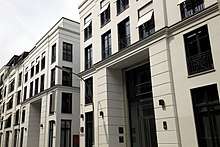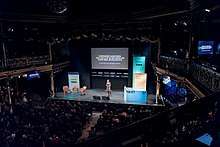SinnerSchrader
SinnerSchrader is a digital agency with headquarters in Hamburg.[1][2] It is considered among the leading companies in the industry.[3] SinnerSchrader, established in 1996, has been listed on the stock exchange since 1999 and maintains offices in Hamburg, Berlin, Frankfurt am Main, Munich and Prague.[4][5] Since April 2017, the agency has been part of Accenture Interactive.[6]
 | |
 Headquarters of SinnerSchrader | |
| Aktiengesellschaft | |
| Traded as | FWB: SZZ |
| ISIN | DE0005141907 |
| Industry | Internet, E-Commerce |
| Founded | 1996 in Hamburg, Germany |
| Founder |
|
| Headquarters | Hamburg , Germany |
Key people |
|
| Revenue | (FY 2016/2017) |
Number of employees | (FY 2016/2017) |
| Parent | Accenture Interactive |
| Website | sinnerschrader.ag |
| Footnotes / references Annual Report 2016/2017 | |
SinnerSchrader's focus is on strategy, creation and development of digital products and services.[5] The agency's clients include Allianz, Audi, Comdirect, Tui, Unitymedia and Volkswagen, for example.[7] Since 2006, SinnerSchrader has been staging the Next Conference, one of the key sector meetings in the digital industry.[8][9]
History
In 1996, the company was founded as a civil law company by Oliver Sinner and Matthias Schrader. One year later, it was turned into a limited liability company, and finally in 1999, it became a stock corporation to facilitate participation of outside investors.[10] Headquarters were established in the former Johannes Krause tanning machinery factory in Hamburg-Ottensen.[11] One of SinnerSchrader's main areas of business was e-commerce.[12]
To finance further growth, SinnerSchrader went public on the Frankfurt Stock Exchange in November 1999.[4] As a result, the company raised some €28 million, which in the aftermath of the dot-com bubble was redistributed to the shareholders.[13] SinnerSchrader bore the severe brunt of the new market's collapse: Revenues plummeted, though due to sufficient liquidity, the company’s status as a going concern was never in jeopardy.[14] Amid other measures, SinnerSchrader responded to the sector crisis by cutting staff and reducing working hours.[15] In 2002, Oliver Sinner left the company.[16]
The austerity program had the desired effect,[17] and in the 2004/2005 financial year, SinnerSchrader once again turned a profit.[18] Since that time, the survival of the company in the era after the dotcom crash is considered exemplary for the former new economy.[19] Nonetheless, SinnerSchrader was inducted into the 2005 ranking of the greatest capital destroyers by the Deutsche Schutzvereinigung für Wertpapierbesitz, Germany’s leading association for private investors, which SinnerSchrader called into doubt due to its unfair methodology.[20]
In the years to follow, e-commerce remained an important line of business for SinnerSchrader.[21][22] From 2007, the company made the best of the global financial crisis to grow through acquisitions.[23] Moreover, in 2010, an advertising agency was established, specializing in brand communication in the digital field.[24] In 2012, it received the Red Dot Design Award in the category of communication for its corporate design.[25] In the 2010s, SinnerSchrader expanded its range of activities into additional areas such as business intelligence and data management.[26] The company ascended in the ranking of the Bundesverband Digitale Wirtschaft, the German association for the digital economy, to the leading agency in the segment of "business transformation".[27] In 2017, the portfolio was expanded to include data analytics and data science, along with advisory services.[28][29]
Also in 2017, the international management and technology consulting firm, Accenture, announced the takeover of the majority of shares in SinnerSchrader.[30][31] This was favorably received in the media, as it enabled Accenture to expand its digital expertise and unveiled additional growth opportunities to SinnerSchrader.[32][33][34] The company gained the opportunity to fortify its international presence and to become known worldwide.[35] In the first step, Accenture Digital Holdings secured some 62% of the equity capital and the voting interests of SinnerSchrader, and subsequently expanded its participation even further.[36] The new owners seek to squeeze out the minority shareholders. The business units of Accenture Interactive and SinnerSchrader are operated separately for a transition period.[37]
Structure
SinnerSchrader is a stock corporation under German law. The subject matter of the company is essentially "developing and implementing concepts (including software) for the sales of goods or services over the Internet or other new media" and all related activities and investments.[38] Since 2003, the shares of SinnerSchrader have been traded in the Prime Standard of the German Stock Exchange.[39] The company has applied for a change to the General Standard segment.[40] In November 2017, 65.9% of the shares were owned by Accenture, 5.2% were held by the capital management firm Hansainvest, and 2.2% by the private equity firm Sparta. The remaining shares (26.7%) were owned by diverse shareholders.[41]
By statute, the Management Board of SinnerSchrader consists of at least two persons. Management is currently headed up by company founder Matthias Schrader (CEO) and Thomas Dyckhoff (CFO). The Supervisory Board comprises three people: Frank Riemensperger holds the position of Chairman, Philip W. Seitz and Daniel Schwartmann are ordinary members.[41]
SinnerSchrader's consolidation group in the 2016/2017 financial year encompassed seven companies. As the key business unit, SinnerSchrader Deutschland is responsible for business in the German home market. There is an additional regional branch office in the Czech Republic. The subsidiaries in the United Kingdom and the Netherlands have no operative business activities.[41]
SinnerSchrader Commerce is specialized in e-commerce, SinnerSchrader Content in content-driven communication and SinnerSchrader Swipe in mobile products such as apps.[41] With its subsidiaries and shareholdings, SinnerSchrader forms the so-called SinnerSchrader Group, which is in turn part of Accenture Interactive. The shares of the company are held by Accenture Digital Holdings. A control and profit transfer agreement is in effect.[42]
Conference

In 2006, marking a company anniversary, SinnerSchrader established the Next Conference.[43] The event explores the ramifications of technological innovations on human behavior and the resulting consequences for companies and society. The Next Conference had developed into an important sector rendezvous for the Internet industry. The main areas of focus are in the fields of artificial intelligence, product design and consumer behavior.[8][9]
From the year 2010, the Next Conference was staged in Berlin, and in 2015, it returned to Hamburg.[44][45] Since then, SinnerSchrader has been organizing the event jointly with the communications agency, Factor 3, within the scope of the Reeperbahn Festival. Prominent speakers in past years have included Tim Ferriss,[46] Bruce Sterling,[47] David Weinberger and Stephen Wolfram.[48][49]
References
- "Company Register". Bundesanzeiger Verlag. Retrieved April 1, 2018.
- Heiner Schmidt (December 22, 2016). "Was die Kreativen in Hamburg leisten". Hamburger Abendblatt (in German). p. 6.
- "Internetagentur-Ranking 2018" (in German). Bundesverband Digitale Wirtschaft (BVDW). Retrieved May 7, 2018.
- Manfred Engeser (December 30, 1999). "Ohne Socken an die Börse". Hamburger Abendblatt (in German). p. 20.
- "What we do". Retrieved April 22, 2018.
- Rath, Julien (February 20, 2017). "Accenture Has Acquired One of the Biggest Digital Agencies in Germany". Business Insider. Retrieved May 17, 2018.
- "Matthias Schrader". Hamburger Abendblatt (in German). March 22, 2018. Retrieved April 22, 2018.
- Holger Schellkopf (September 4, 2017). "Das Werk des Transformators". Werben & Verkaufen (in German). Retrieved May 7, 2018.
- Ania Kozlowska (September 26, 2017). "Destination Check: Next Conference 2017". Netzpiloten Magazin (in German). Retrieved May 7, 2018.
- "Verkaufsprospekt" (PDF) (in German). SinnerSchrader. October 29, 1999. Retrieved April 1, 2018.
- Gisela Schütte (December 3, 1999). "Hamburgs historische Fabrikhallen erleben eine Renaissance". Die Welt (in German). Retrieved April 1, 2018.
- "SinnerSchrader hilft beim Verkauf im Internet". Welt am Sonntag (in German). September 26, 1999. p. 79.
- Melanie Wassink (November 8, 2004). "Geldregen bei SinnerSchrader". Hamburger Abendblatt (in German). Retrieved April 1, 2018.
- "Oliver Sinner steigt aus". Handelsblatt (in German). July 18, 2002. Retrieved April 1, 2018.
- "SinnerSchrader muss Kurzarbeit anmelden". Financial Times Deutschland (in German). July 2, 2002. p. 4.
- Christian Rickens (July 18, 2002). "Abgang eines Gründers". Manager Magazin (in German). Retrieved April 1, 2018.
- "Aktie von SinnerSchrader braucht mehr für ein Comeback". Frankfurter Allgemeine Zeitung (in German). July 13, 2005. Retrieved April 1, 2018.
- "SinnerSchrader lugt über die Null-Linie". Börsen-Zeitung (in German). July 14, 2005. p. 13.
- Hasnain Kazim (October 25, 2007). "Als die große Blase platzte". Spiegel Online. Retrieved April 1, 2018.
- Thorsten Kramer (February 22, 2005). "SinnerSchrader zweifelt DSW-Liste an – Kritik an Rangordnung der größten Wertvernichter". Financial Times Deutschland (in German). p. 19.
- "Die nächste Welle im E-Commerce". Börsen-Zeitung (in German). November 29, 2006. p. 12.
- "SinnerSchrader wächst dank guter Geschäfte im Onlinehandel". Hamburger Abendblatt (in German). November 10, 2010. p. 26.
- Kathrin Fichtel (November 6, 2009). "SinnerSchrader wächst durch Zukäufe". Hamburger Abendblatt (in German). p. 28.
- Kathrin Fichtel (February 10, 2011). "SinnerSchrader gründet Werbeagentur". Hamburger Abendblatt (in German). p. 26.
- "Red Dot Design Award für Haasenstein" (in German). SinnerSchrader. June 29, 2012. Retrieved May 7, 2018.
- "Virtueller Strippenzieher". Börse Online (in German). April 10, 2014. p. 25.
- "Internetagentur-Ranking 2016" (in German). Bundesverband Digitale Wirtschaft (BVDW). 2016. Retrieved May 7, 2018.
- Marc Bartl (January 27, 2017). "Martin Holtschneider ist Head of Analytics and Data Science bei der Digitalagentur SinnerSchrader". Kress (in German). Retrieved April 22, 2018.
- Anja Janotta (March 27, 2018). "So arbeitet es sich bei … SinnerSchrader". Werben & Verkaufen (in German). Retrieved May 7, 2018.
- "SinnerSchrader: Accenture schnappt sich deutsche Digitalagentur". Handelsblatt (in German). February 20, 2017. Retrieved April 1, 2018.
- "Accenture Buys Controlling Stake in German Design Studio Sinnerschrader". Consultancy. April 19, 2017. Retrieved May 17, 2018.
- Volker Schütz (February 20, 2018). "Ein nachvollziehbarer Schritt". Horizont (in German). Retrieved April 1, 2018.
- "Accenture baut Internetagenturgeschäft aus". Börsen-Zeitung (in German). February 21, 2017. p. 7.
- Bialek, Catrin (February 21, 2017). "Accenture Expands Digitally in Germany". Handelsblatt. Retrieved May 16, 2018.
- Harald Willenbrock (2017). "Der lange Abschied". Brand Eins (in German) (10). pp. 120–129.
- "Accenture kauft Internetfirma SinnerSchrader". Spiegel Online (in German). February 20, 2017. Retrieved April 22, 2018.
- "Der Name Sinner-Schrader wird verschwinden". Hamburger Abendblatt. May 4, 2017. p. 7.
- "Satzung" (PDF) (in German). SinnerSchrader. February 2, 2017. Retrieved April 1, 2018.
- "Frankfurt Stock Exchange" (in German). Retrieved April 1, 2018.
- "Sinnerschrader Decides on Application to Change from Prime Standard to General Standard". SinnerSchrader. April 10, 2018. Retrieved May 7, 2018.
- "Annual Report 2016/2017" (PDF). SinnerSchrader. p. 26. Retrieved April 1, 2018.
- "Company Acquisition Document Library" (in German and English). Accenture. Archived from the original on May 14, 2018. Retrieved April 1, 2018.
- Herbert Braun (May 29, 2006). "Ich-Netze: Die deutsche Web-2.0-Szene debattiert über die Online-Zukunft". c’t Magazin (in German). Retrieved April 1, 2018.
- Jessica Becker (February 4, 2015). "Next: Digitalkonferenz kehrt nach Hamburg zurück". Horizont (in German). Retrieved April 1, 2018.
- Frank Kemper (February 4, 2015). "Next Conference zieht zurück nach Hamburg". Internet World Business (in German). Retrieved April 1, 2018.
- "Tim Ferriss". Next Conference. Retrieved May 7, 2018.
- Markus Böhm (November 11, 2017). "Drei Tipps, um die Zukunft vorherzusagen". Spiegel Online (in German). Retrieved May 7, 2018.
- "David Weinberger". Next Conference. Retrieved May 7, 2018.
- "Stephen Wolfram". Next Conference. Retrieved May 7, 2018.
External links
| Wikimedia Commons has media related to SinnerSchrader. |
- Official website of SinnerSchrader